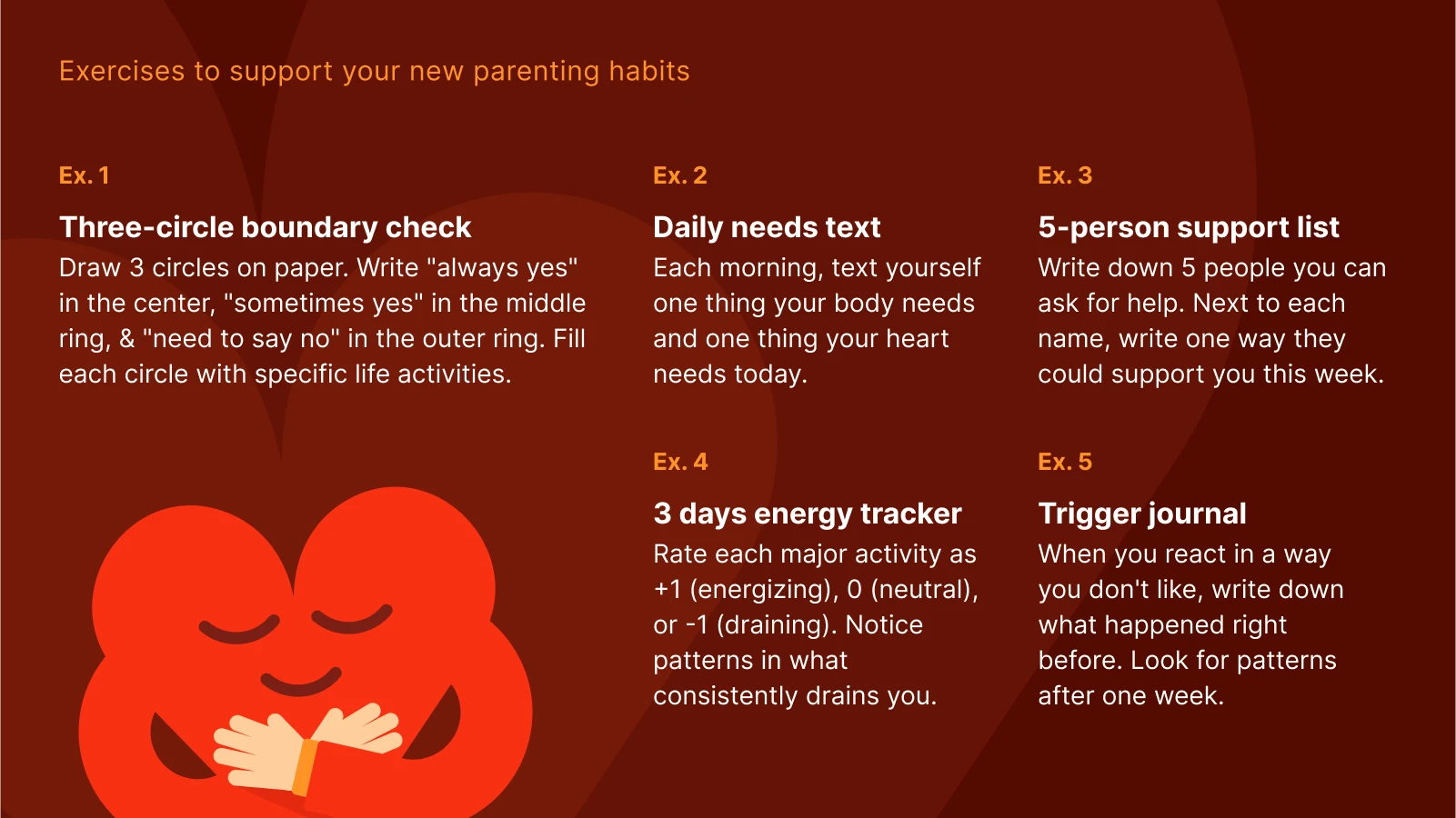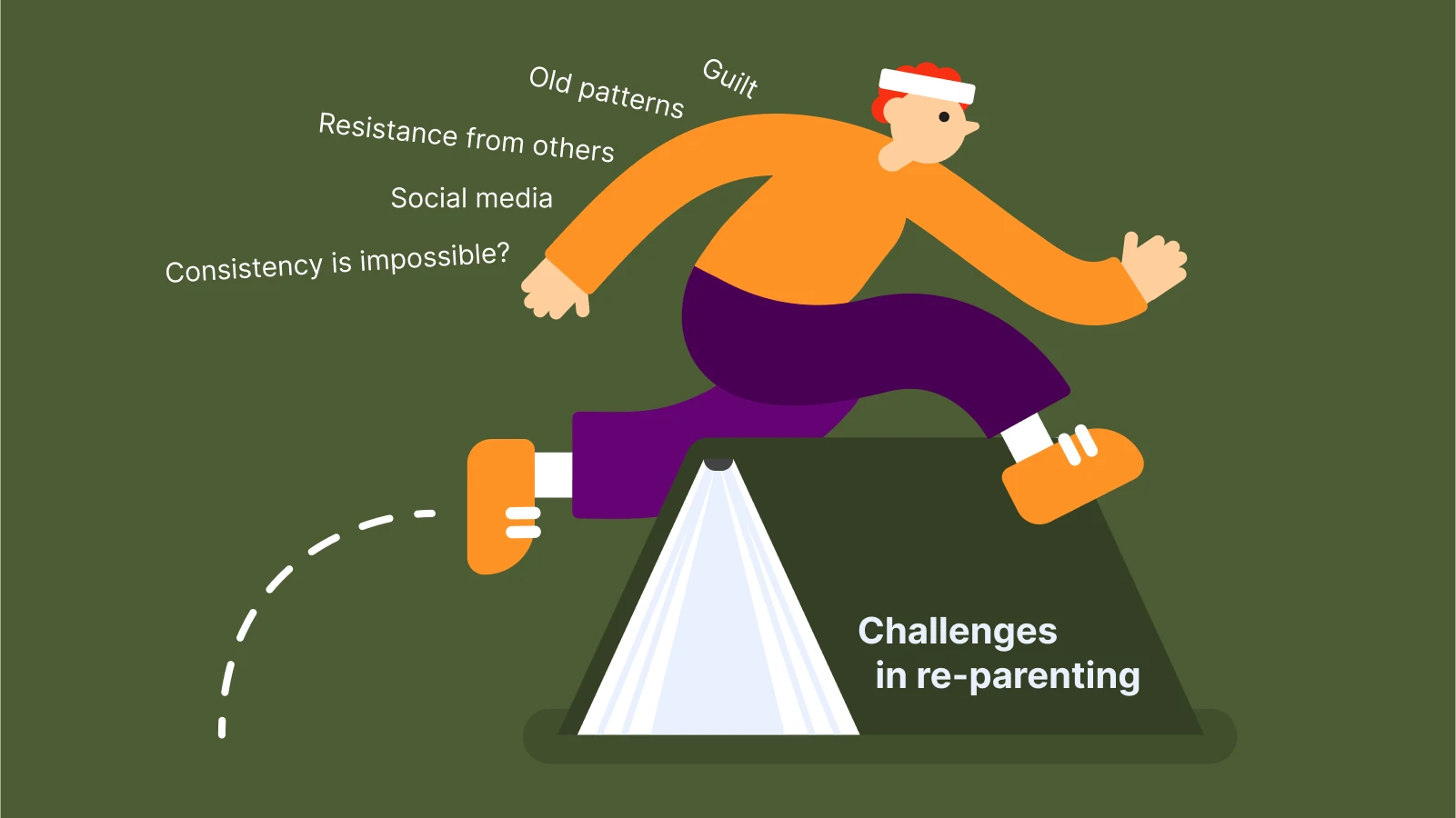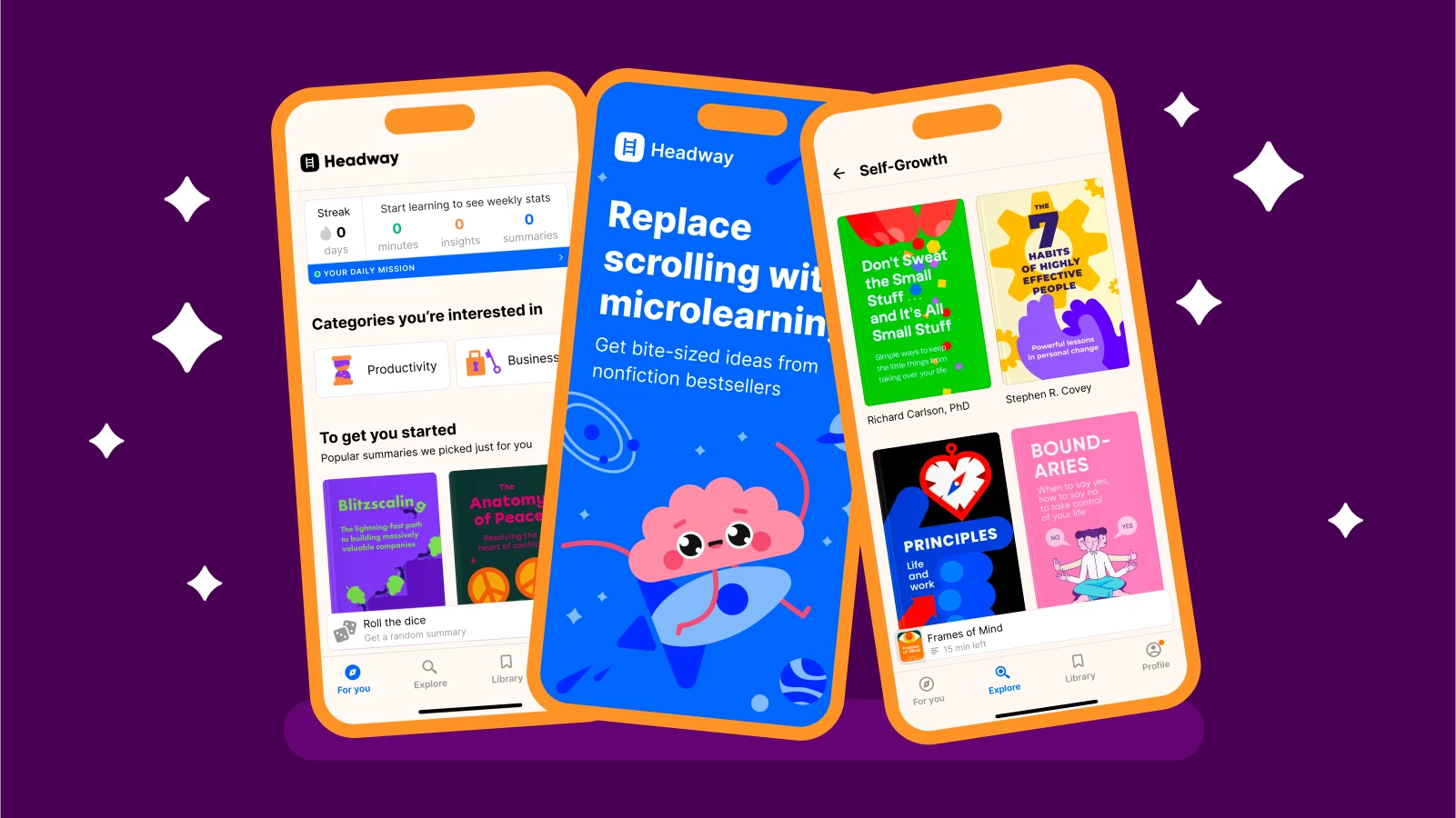Have you ever caught yourself repeating something your mom said and immediately thought, "I swore I'd never say that"? You're not alone. Many mothers find themselves wrestling with habits and learning how to be the mom they needed. It's not about being perfect. It's about breaking patterns and giving your children the love and patience you once craved.
Ready to break those generational cycles but don't know where to start? This guide combines insights from parenting experts like Pamela Druckerman, Dolly Alderton, Joyce Meyer, and William H. McRaven into practical steps that busy moms can actually use.
Get ready to celebrate your self-growth milestones. And by the time you reach the last line, you'll finally know how to make them happen.
Quick answer: How I'm learning to be the mother I needed
Give your child what you lacked as a child — the validation, attention, and emotional support.
Practice self-reparenting to nurture your own inner child through self-compassion.
Listen to your child's big feelings first and acknowledge their emotions before rushing to fix anything.
Set boundaries with love and explain the reasons behind the rules to provide security.
Apologize and take responsibility when you lose your cool to model emotional maturity.
Say "no" without guilt to protect your energy by declining what drains you.
Track your emotional triggers and notice patterns that set you off so you can prepare different responses.
Use bite-sized learning tools like Headway to access expert wisdom from parenting books through 15-minute summaries that fit your busy schedule.
Why I'm learning to be the mom I needed
Being the mom you needed means giving your child what was missing from your childhood.
As I watch my children grow, I often think about the girl I used to be. I still remember coming home proud of a school award, only to find my parents barely glancing up from the newspaper. Or crying in the grocery store and being told to "toughen up."
Those moments — tiptoeing around unpredictable moods, wondering if my normal, energetic self would get a smile or a scolding — stuck with me far longer than I ever expected. They quietly taught me what kind of attention I believed I deserved and what love should look like.

Now, as a mother, I get to rewrite that story. For me, being the mom I needed means noticing the little things, hugging instead of hushing, and celebrating even the smallest victories. It means parenting my child — and myself — with the care, patience, and emotional safety I once longed for.
Pamela Druckerman's insights in 'Bringing Up Bébé' helped me see how cultural expectations affect parenting. She gives examples that are easy to relate to and shows ways to be different parents by observing other cultures. For one thing, she notes that French parents stay involved without becoming obsessive:
Yet the French have managed to be involved without becoming obsessive. They assume that even good parents aren't at the constant service of their children, and that there's no need to feel guilty about this.
And no, this isn't about blaming the family member who raised you. Your caregivers did their best with what they knew. But you can choose to do things differently, as a new mom of a new generation.
What is reparenting, and why does it matter for moms?
Reparenting is an established psychological practice of nurturing and healing the unmet emotional needs from your childhood. Psychiatrist Jacqui Lee Schiff introduced the concept in the 1960s, and it has been refined by experts such as John Bradshaw and Pete Walker over the decades.
It has gained massive popularity recently as more parents recognize how deeply childhood experiences shape our adult mental health and parenting styles.
Whether you're a first-time mom or a mom of two, reparenting yourself is a decisive step, not just to heal old wounds, but to break generational cycles to change whole lives — yours and your children's.
What's the difference between therapeutic reparenting vs. self-reparenting?
Most people don't realize there are actually two different ways to approach reparenting. It all comes down to who's doing the nurturing, and where does it happen?
Therapeutic reparenting:
A therapist acts as a stand‑in parent during your sessions.
They offer the care and validation you missed, while staying within professional boundaries.
Techniques include inner child work, role‑playing, or regression exercises to heal old wounds.
Self-reparenting:
You learn to meet your own needs instead of relying on a therapist to guide you.
You soothe your inner child through self‑compassion, replacing harmful inner messages and practicing emotional regulation.
This approach is practical for ongoing self-care outside of therapy sessions.
For many busy moms, self‑reparenting is the most realistic path. You can practice it outside of therapy sessions, during daily moments of motherhood, and as part of your long-term emotional growth.
How to be the mom you needed: Seven daily practices
Real change doesn't happen overnight or after reading one parenting book on Amazon. It requires doing specific things differently every single day. These approaches help you become the emotionally available parent you wish to be. As Dolly Alderton writes in 'Everything I Know About Love,'
To choose to love is to take a risk.
Parenting differently from how you were raised takes courage, but it's worth it.
| Practical action | What it means | Parenting in practice |
|---|---|---|
Listen to their big feelings first | Don't rush to fix. Acknowledge and make space for emotions to build trust and safety. | "I know you don't want to get in the car seat right now. Let's take a big breath, then we'll buckle up to go see your friend Jerry." |
Set limits with love | Boundaries aren't harsh — they provide structure and emotional security. Explain the reason behind the rules. | "We don't draw on your friend's new book. That belongs to them, and we need to respect their things. Here's some paper for your artwork." |
Make special time together | Regular one-on-one time nurtures connections. It doesn't need to be big or expensive. | Try having tummy time together during your baby's first year, reading the same bedtime story every night, or having special Saturday morning cuddles before anyone else wakes up. |
Fix things when you mess up | When you lose your cool, go back, take responsibility, and own it. This models emotional maturity. | "I was too loud earlier. I was feeling stressed, but that's not your fault. I'm sorry." |
Show them how to handle emotions | Narrate your emotional regulation strategies so they learn through observation. | "I'm feeling overwhelmed, so I'm going to take a few deep breaths to calm down." |
Ask questions instead of lecturing | Let them express themselves instead of offering solutions right away. Reflect on what you hear to validate their feelings. | "It sounds like you're disappointed that your friend couldn't come over today." |
Protect your energy with boundaries | Recognize that your energy isn't infinite. Say "no" to what drains you, and "yes" to help when needed. | Decline the extra work project, ask your partner to handle bedtime, or let a friend bring dinner when you're overwhelmed. |
As you grow into a more present, emotionally available parent, it's normal to wobble between extremes, overcorrecting to get everything "right" or slipping back into old habits. The goal isn't flawlessness; it's awareness.
Love and hurt can coexist. Seeing that complexity helps you release perfectionism and choose small, steady shifts instead. Here is how Michelle Zauner captures the reality of mixed signals in 'Crying in H Mart':
Food was how my mother expressed her love… I could always feel her affection radiating from the lunches she packed and the meals she prepared for me just the way I liked them.
Self-care isn't optional: Exercises to support your new parenting habits

The strategies in the table above work best when you're taking care of yourself too. These exercises help you build the self-awareness and emotional resilience you need to consistently show up as the emotionally available parent you're working toward.
Exercise 1: Three-circle boundary check
Draw three circles on paper. Write "always yes" in the center, "sometimes yes" in the middle ring, and "need to say no" in the outer ring. Fill each circle with specific activities from your life.
Exercise 2: Daily needs text to yourself
Each morning, text yourself one thing your body needs and one thing your heart needs today.
Exercise 3: Five-person support list
Write down five people you can ask for help. Next to each name, write one specific way they could support you this week.
Exercise 4: Energy tracker for three days
Rate each major activity as +1 (energizing), 0 (neutral), or -1 (draining). Notice patterns in what consistently drains you.
Exercise 5: Trigger moment journal
When you react in a way you don't like, write down what happened immediately before. After one week, look for patterns.
Remember, your healing journey matters more than you realize. As Daniel J. Siegel writes in 'The Whole-Brain,'
As parents become more aware and emotionally healthy, their children reap the rewards and move toward health as well. That means that integrating and cultivating your own brain is one of the most loving and generous gifts you can give your children.
Every small step you take toward understanding yourself better creates ripple effects that benefit your entire family.
Overcoming challenges and obstacles in reparenting

This path isn't always easy. You'll hit bumps, feel guilty, and sometimes wonder if you're doing new things right. That's completely normal and part of the process. Some of the challenges you'll face might be:
Guilt for parenting differently: You might feel bad for wanting to parent differently from they did. Remember, choosing a new way doesn't mean your parents didn't love you. It simply means you're applying what you've learned to create something better.
Old patterns return during stress: After a long day of full-time work or dealing with a fussy little one, you might find yourself sounding just like your mom or dad. Don't give up when it gets hard — that's precisely when the real change happens.
Pushback from family: Family members might question why you're not raising kids like they did. They might say things like, "We turned out fine," or criticize your choices. Remember, you don't need permission to break cycles and create the family dynamics you want.
Comparison on social media: The more time parents spend looking at this kind of content, the more stressed and discouraged they feel. It's not just in your head; comparison really does steal joy. Especially if you are a new mother.
Feeling like consistency is impossible: Learning new skills while managing everyday life can feel overwhelming. Start small. Maybe focus on one thing this week, like not yelling when you're frustrated.
As William H. McRaven writes in 'Make Your Bed,'
Life is a struggle and the potential for failure is ever present, but those who live in fear of failure, or hardship, or embarrassment will never achieve their potential. Without pushing your limits, without occasionally sliding down the rope headfirst, without daring greatly, you will never know what is truly possible in your life.
Parenting differently takes courage, but the growth you'll see in yourself and your children makes it worthwhile.
The key is remembering this is a long journey, not something you'll master overnight. Every time you choose patience over anger, you're rewiring your brain and your family's patterns. But here's what makes the biggest difference: self-reflection. As Daniel Coyle writes in The 'Talent Code', quoting Samuel Beckett,
Try again. Fail again. Fail better.
Why you need to reflect on your parenting journey and how to start today
To help you stay grounded and see how far you've come, I've prepared an 8-week self-reflection template you can use in your journal. I designed it to help you slow down, notice small wins, and gently observe where you're still growing. There are no right or wrong answers — just honest check-ins with yourself.
| Week | Journaling tip | Self-reflection questions |
|---|---|---|
Week 1 | Start small. Focus on one little thing every day, but remember: it should be a meaningful interaction. | - When did I truly listen without interrupting? - What did I learn about my child today? |
Week 2 | Notice your triggers. Write down what upset you and how you responded. | - What situations brought up stress or impatience? - Did I respond or react? What would I change next time? |
Week 3 | Celebrate emotional wins — no matter how small. | - When did I stay calm in a moment when I used to lose my temper? - How did my child respond to my emotional tone today? |
Week 4 | Reflect on connection, not perfection. | - Did I make time to connect with my child today? - What helped deepen our bond this week? |
Week 5 | Focus on repair, not guilt. Write down how you handled mistakes. | - Did I apologize or repair a moment where I lost control? - How did that affect our relationship? |
Week 6 | Observe your child's behavior for signs of trust. | - Is my child coming to me with their feelings more often? - When did I notice them feeling safe or open with me? |
Week 7 | Reflect on your emotional habits. | - How have I changed in how I handle hard moments? - What helps me stay grounded when things get chaotic? |
Week 8 | Look at the big picture. Celebrate progress. Make notes to build a support system. | - What patterns or shifts do I see in myself and my child? Are the child needs of both of us satisfied? - How am I becoming the mother I needed as a child? |
The hardest part of self-reflection is facing uncomfortable truths about yourself — the patterns you'd rather ignore, the mistakes that still sting, or the ways you've hurt others. It's scary to look at your flaws honestly because it threatens how you see yourself.
Add in our busy lives, constant distractions, and the fear of what we might discover, and it's no wonder most people avoid deep self-reflection. But this discomfort is where real growth begins.
You can also teach your child to reflect on their actions and emotions. If you have older kids, books like Joyce Meyer's 'Battlefield of the Mind for Kids' can teach them to understand their thoughts and feelings better. This young readers' edition helps children navigate the complex world of emotions and provides tools for recognizing what influences their thinking.
Become the mom you needed with Headway book summaries
Get 15-minute summaries of the world's best parenting and personal growth books, delivered exactly when you need them most. No matter if you're a working mom juggling deadlines, breastfeeding between meetings, or navigating the emotional rollercoaster of postpartum life, finding time to read full books can feel impossible. That's where Headway changes everything.

So why do busy moms choose Headway for their growth journey? There are several reasons for this:
Daily microlearning that fits your real life: Every morning, get bite-sized insights from a variety of books in just a few minutes. Whether you're sipping coffee before the kids wake up or listening during your commute like a podcast, these daily doses help you stay connected to your growth without adding pressure to your already packed schedule.
Personalized book recommendations based on your parenting goals: Hint to Headway that you want to improve emotional regulation or break generational patterns, and you'll get a customized reading list.
Audio and text options for every moment: The Headway app adapts to how you can fit in learning. This flexibility means you never have to choose between self-improvement and handling daily mom life.
Ready to turn everyday childcare moments into opportunities for your growth too? Start your personalized learning journey with Headway's book summaries and discover the insights that will help you become the emotionally available, present mom you're working toward. Your healing matters — and it doesn't have to wait until you have more time.
Frequently asked questions about the motherhood
What is depleted mom syndrome?
Depleted mom syndrome is intense physical and emotional exhaustion from constant caregiving demands. It happens when you're giving more than you have, leading to chronic fatigue, irritability, and loss of joy. Learning to be the mom you needed includes recognizing when you're depleted and prioritizing your mental health and self-care.
What is the hardest part of being a mother?
The constant, never-ending demands that require physical endurance, emotional strength, and personal sacrifice, often without enough support or rest. It's the mental load of always being "on" and responsible for another human being's well-being while managing your own needs and challenges.
What is supermom syndrome?
Supermom syndrome hits mothers who try to be perfect at everything — work, home, parenting, and keeping everyone happy. This constant pressure to excel in every area leads to chronic stress, anxiety, and complete burnout.
Learning to be the mom you needed means letting go of perfectionism and accepting that good enough is good enough for your family.
What is a non-biological mom?
A non-biological mom is someone who parents a child without a genetic connection, like adoptive mothers, stepmothers, or co-mothers in partnerships. Motherhood is about love, care, and daily nurturing, not biology. These deep bonds form through time spent together and emotional connection.
What is a mother's instinct?
A mother's instinct is your natural drive to care for and protect your child, but it's not automatic or the same for everyone.
It develops through a mix of hormones (like oxytocin), learned behaviors, and emotional bonding over time. Some moms feel it immediately, others gradually — both are entirely normal and don't reflect your worth as a mother.













